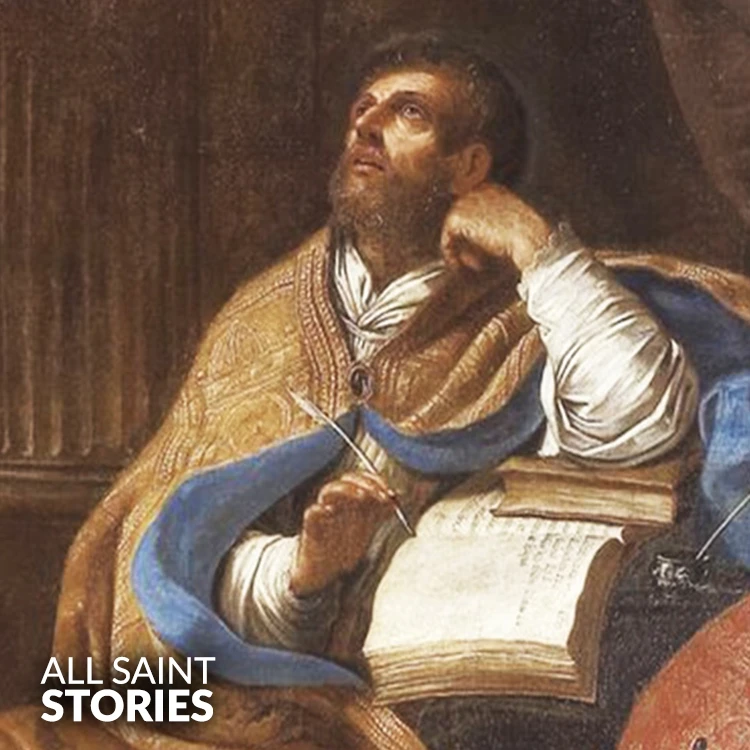"Saint Peter Chrysologus, faithful servant of Christ, guide us in wisdom and truth, that we may live in harmony with God's word. Intercede for us, that we may grow in holiness and share the love of Christ with others. Through your prayers, may we be strengthened in our faith and devotion. Amen."
ST. PETER CHRYSOLOGUS (BISHOP)
ST. PETER CHRYSOLOGUS (BISHOP)

St. Peter Chrysologus, bishop of Ravenna and Doctor of the Church, was known for his eloquent and powerful homilies. Renowned for his pastoral care, he is remembered for his deep theological insight and ability to communicate complex truths clearly and succinctly. He is honored as a key figure in early Christian preaching and doctrinal development.
St. Peter Chrysologus was born around 380 AD in Imola, Italy, and became the bishop of Ravenna around 433 AD. He is primarily remembered for his exceptional preaching and his ability to communicate the faith to his people in a clear and accessible manner. His title, "Chrysologus," meaning "golden-worded," reflects his reputation for eloquent homilies that both educated and inspired his listeners. St. Peter was not only a preacher but also a strong theological figure who contributed to the development of early Christian doctrine. During his episcopacy, he worked tirelessly to strengthen the faith and promote a clear understanding of the Church’s teachings, particularly after the controversies and debates following the Council of Ephesus (431 AD).
His sermons, known for their brevity yet profound insight, often focused on the mysteries of the Christian faith, particularly the nature of Christ and the importance of the Church. St. Peter Chrysologus’s preaching was directed not only at his clergy but also at the general public, making complex theological ideas accessible to all. His writings included over 160 homilies that continue to be valued for their theological depth and pastoral warmth.
In his role as bishop, St. Peter was a fierce defender of the orthodox faith against heretical movements and a pastoral leader who cared deeply for the spiritual wellbeing of his people. His work ensured the clarity of doctrine during a time when the Church was defining many of its key theological positions. He played a key role in combating the spread of various heresies, particularly the teachings of Nestorius, and worked to promote unity within the Church.
Peter Chrysologus was also known for his great devotion to the Eucharist, which he considered the center of Christian life. His homilies often emphasized the sacramental life and the importance of living in accordance with the teachings of the Church. His approach to theology was deeply rooted in scripture, and he is regarded as one of the great early Church Fathers.
St. Peter Chrysologus was revered not only for his work as a preacher but also for his holiness and pastoral care. He was known to have a personal relationship with his clergy and people, offering guidance, comfort, and spiritual counsel. His influence extended beyond his own time, and his writings were later influential in the development of the Church's teaching on Christology and the nature of salvation.
Peter Chrysologus died around 450 AD, and while specific details of his death and canonization are unclear, he was later recognized as a Doctor of the Church. His feast day is celebrated on July 30. He remains an important figure in the history of the early Church for his contributions to theology, preaching, and pastoral care.
Video Not Found
No images uploaded for this saint yet.
The information on this website is compiled from various trusted sources. While we aim for accuracy, some details may be incomplete or contain discrepancies.
If you notice any errors or have additional information about this saint, please use the form on the left to share your suggestions. Your input helps us improve and maintain reliable content for everyone.
All submissions are reviewed carefully, and your personal details will remain confidential. Thank you for contributing to the accuracy and value of this resource.
Credits & Acknowledgments
- Anudina Visudhar (Malayalam) – Life of Saints for Everyday
by Msgr. Thomas Moothedan, M.A., D.D. - Saint Companions for Each Day
by A. J. M. Mausolfe & J. K. Mausolfe - US Catholic (Faith in Real Life) – Informational articles
- Wikipedia – General reference content and images
- Anastpaul.com – Saint images and reflections
- Pravachaka Sabdam (Malayalam) – Saint-related content and insights
We sincerely thank these authors and platforms for their valuable contributions. If we have unintentionally missed any attribution, please notify us, and we will make the correction promptly.
If you have any suggestion about ST. PETER CHRYSOLOGUS (BISHOP)
Your suggestion will help improve the information about this saint. Your details will not be disclosed anywhere.
© 2026 Copyright @ www.allsaintstories.com


 English
English
 Italian
Italian
 French
French
 Spanish
Spanish
 Malayalam
Malayalam
 Russian
Russian
 Korean
Korean
 Sinhala
Sinhala
 Japanese
Japanese
 Arabic
Arabic
 Portuguese
Portuguese
 Bantu
Bantu
 Greek
Greek
 German
German
 Dutch
Dutch
 Filipino
Filipino